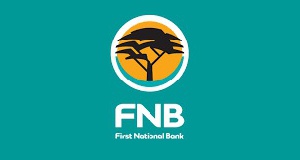 FNB projects 4.5% economic growth
FNB projects 4.5% economic growth
First National Bank has said the Ghanaian economy is not likely to expand as much as the government expects, pegging its economic growth projection for the year at 4.5percent, as against government’s 6.3percent growth target.
Speaking at the bank’s second economic and business breakfast meeting, its Africa Macro Strategist for Global Markets, Celeste Fauconnier, said: “Our biggest reason is that, the growth projection that we have is based-on oil prices increasing, production increasing and so on. But we must admit that the oil prices are not increasing significantly and production is not a forecast from the way Nigeria and Angola produce.
But my biggest thing is fiscal consolidation… Even though they have made a lot of promises in their campaigning, they cannot over expend. They still need to keep their fiscal consolidation at the top of their policy making. So, that is why we believe that growth would not expand significantly as the government thinks it would.”
Celeste Fauconnier further stated that, “we will one day grow at the 6% but not now or in 2017. I think is too early coming from a much lower rate that we have seen last year, which was 3.6% last year. So, jumping from the around 3% to double of that, to me, is a bit over optimistic. I think Ghana should realise that we are in a recovery period but as we see in the rest of Africa it is not going to be possible.”
Per FNB’s projections it would not be until 2018 before growth hits the 6percentum mark.
The Akufo-Addo government has projected an overall real GDP growth of 6.3% for 2017, which includes oil while the non-oil real GDP growth for the government within the same period is also estimated at 4.6%.
Other macroeconomic targets for the government is to have Gross Foreign Assets to cover at least 3 months of imports of goods and services while the primary surplus is also to end the year at 0.4% of GDP, and the overall fiscal deficit for the year is expected to be at 6.5% of GDP.
End inflation targeting
Celeste Fauconnier also called for on the central bank to balance in inflation targeting with growth targeting, arguing that, in Ghana, inflation is determined by cost push factors rather than demand driven factors, which has no direct bearing on the country or central bank’s policy rate decisions.
The government is targeting 11.2% inflation closing 2017, but FNB thinks 13.0% is a more realistic projection.
“My point is: in South Africa inflation is driven by both demand and cost push factors but we have seen over the past few years that, inflation in Ghana is driven by only cost push factors. If you have cost push pressures, the movement of the monetary policy rate won’t help. It is when it is demand pressures that the monetary policy rate would help. A very good example is in the 2000s, when we saw interest rates were high, inflation was very high as well, but in 2011 when inflation was low then the monetary policy rate was also quite low.
That doesn’t make sense but the one should go the other way around. So that is why I am saying that inflation targeting is not necessarily the wrong thing to do but I think the central bank would have to balance it more with growth targeting. Growth is what we needed after coming out of the two-year recession the whole of Africa had gone through. So, we need to boost growth and the private sector,” she added.
Cedi will Stabilise through 2017
The local currency, which has maintained its superb run against the US dollar since the second week of March, eroding all the losses it incurred since the start of the year and even rising by one percent, according to the Celeste Fauconnier, would be relatively stable in the next two years.
“I think the Cedi is very sentiment driven; so, any good or bad news has a strong effect on the cedi. However, the cedi is a managed currency, so, if it goes to the extreme in performance, we do know that the central bank would intervene and help the currency from being so unstable. But what I can tell you is that, in the next two years, our view is that the cedi would be relatively stable. The cedi has a natural depreciating trend because your dollar is always stronger than the supply.
This is always because the import is still strong in Ghana and so we will see a slight depreciation towards the end of the year but what is going to help is sentiments and the inflows of FDI’s.
Also, the FX from the oil production will also come in and make the cedi even stronger and then we got the IMF helping with the cocoa syndicated loan as well. And so, we do have enough funds for the next two years to keep the currency stable.”
She advised that positive sentiment be built to attract more investments instead of the over-reliance on Eurobonds, cocoa syndicated loans and IMF funding.
Ghana’s economy, she further argued, needs deepened diversification away from its over-reliance on commodities, and the restoration of agriculture to its glorious days.